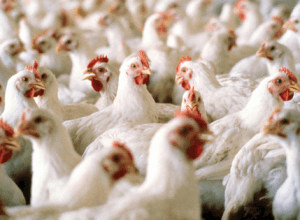Ghana’s struggling poultry industry to get US help
 Ghana’s struggling poultry industry is hoping for help from the United States Department of Agriculture (USDA) to turn it around.
Ghana’s struggling poultry industry is hoping for help from the United States Department of Agriculture (USDA) to turn it around.
Crippling competition from its counterparts in developed countries forces the country to import large amounts of chicken.
In 2010, the country imported over 200,000 tonnes of frozen chicken from the EU, USA and Brazil, valued at $200 million.
In 2014 the country imported 144,000 tonnes of chicken.
Poultry hatcheries in the country are reportedly also not producing at full capacity.
The hatcheries are running at 60 per cent of capacity due to low demand, a report prepared by the USDA, published August 6, 2013 says.
The country’s poultry farmers in addition to high interest rates on loans, are having to deal with bankers reluctant to lend to farmers.
But a USDA project to assist Ghana’s poultry farmers does appear to have some bright prospects for the industry, which is also currently dealing with an outbreak of bird flu or avian influenza, which has been managed so far and has not spread.
Speaking in an interview with ghanabusinessnews.com, the Executive Secretary of the Greater Accra Poultry Farmers Association, Mrs Victoria Norgbey noted that Ghana’s poultry sector was not new to such assistance and said with the avian influenza under control – no recorded cases in about six weeks – the sector is poised for the project.
The USDA will in collaboration with other organizations, implement a project to boost Ghana’s poultry industry by providing training, procuring and promoting improved poultry feed and ingredients.
The USDA will implement the project with the American Soybean Association’s (ASA) World Initiative for Soy in Human Health (WISHH) and the Adventist Development and Relief Agency (ADRA-Ghana).
The project which is expected to benefit US soybean growers as well as Ghana’s poultry and feed industry, will among other things, train Ghanaian poultry producers, procure 15,000 metric tonnes of American soybean meal, improve feed milling practices and products, and enhance their storage and handling.
“The project will contribute to increasing the supply of both meat and eggs to address ever-growing demand in Ghana”, Dr William Brown, Country Director of ADRA-Ghana was quoted as saying.
The American Soybean Association’s President Wade Cowan was quoted as saying that this project “that supports expanded and mutually beneficial trading relationships” could “trigger the growth of poultry, maize and soy industries, which will provide employment and increased income” culminating in poverty reduction.”
USA Poultry and Egg Export Council’s (USAPEEC) Vice President for Marketing Greg Tyler said its members believe that US support of the Ghanaian poultry industry and other agricultural development programmes are part of an important relationship between Ghana and the USA, which in turn will allow for a healthy trade environment between the two nations.
Mrs. Norgbey said it would be beneficial to farmers as it would provide some form of extension services to them through the provision of training. The provision of soybean meal would also alleviate the difficulties posed by the low production of local soya and the “erratic supply” of other feed milling inputs from importers.
She said there was the possibility of a reduction in the prices of poultry products if the project should make headway and make training and quality feed readily available.
The USDA projects developing countries’ demand for agricultural products to increase faster than production and account for 92 per cent of the total increase in world oilseed and meat imports from 2013 to 2022.
Meanwhile in 2013, a Ghanaian team made up of officials from the Ghana National Poultry Farmers Association, government as well as journalists travelled to the US to study the country’s poultry industry.
The tour was as a result of a request made by the then Ghana’s Trade Minister, Ms Hannah Tetteh at a high level meeting with US officials. The meeting looked at how the US can assist in increasing local poultry production in Ghana. This was believed could help reduce the amount of poultry importation into the country.
By Emmanuel K. Dogbevi & Emmanuel Odonkor
Copyright © 2015 by Creative Imaginations Publicity
All rights reserved. This article or any portion thereof may not be reproduced or used in any manner whatsoever without the express written permission of the publisher except for the use of brief quotations in reviews.
